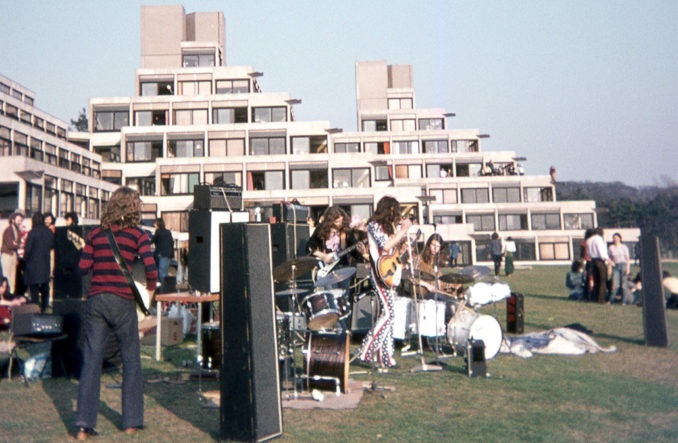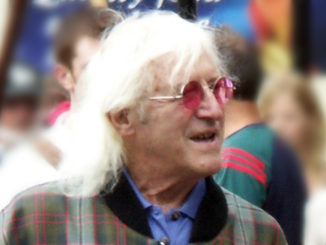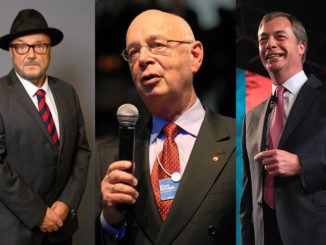Something I enjoyed in my younger years was playing music for fun, preferably in a band. Part 1 of this article covered the years 1963 to 1973 (bands 1-6) and told the story of my primary school band through to the university band I played in. This part tells the rest of the story, and includes a few YouTube videos of recordings we made with ‘Belladonna’. (A shameless attempt to boost the number of YouTube views, so please click!)

Band 7. Belladonna (1981-1982)
A lot of water had gone under the bridge since 1973, and some years later I found myself with a girlfriend who was a peripatetic music teacher of violin and piano for the local education authority. She was a talented musician, having studied at the RCM, and was blessed with Absolute Pitch, sometimes called ‘perfect pitch’. She could tell you which string was out of tune just by listening, without reference to any other note.
She was First Violin (or ‘Concertmaster’) in one of the local orchestras in her spare time when we first met, but by the time we split up a few years later, she’d long given up on the orchestra and much preferred playing folk fiddle in the pub to the regulars. I’d like to think I had a good influence on her!
Belladonna started out as a folk duo after the girlfriend and a guitarist played a few tunes together following his wife’s suggestion the two get together for a ‘musical soirée’. They played together a few times, and were soon turning up at Singers’ Nights (better known as Open Mic Nights these days) at Essex folk clubs in the Winter of 1980-81, generating a bit of interest from stalwarts of the local folk music scene.
Johnny Bugger – We always played this nonsense song as a chorus song when we performed it live. This gave audiences the chance to sing a rude word at the top of their voices a few times if they were so inclined – “gay old bugger”.
In the Spring, the guitarist’s ‘friend’, a singer, guitarist, and whistle player, joined the band. She was followed in the Summer by a chap to play mandolin, after he was recommended by a mutual friend, and finally by Yours Truly, as bass, and third mandolin player.
Prior to joining the band as a musician, I’d been the band’s tea boy, someone to try out tunes and arrangements on, and later as the band’s ‘manager’.
But I’d got tired of sitting in the audience, and applauding as vigorously as I could without making it too obvious, and decided I’d like to join the fun. I’d kept quiet about having been in bands before, partly because, unlike the rest of the band, I hadn’t touched an instrument for 7 years.
I was allowed a trial period, so I bought myself a new bass guitar. The fiddle player wrote down some basic bass lines to get me started on the band’s tunes, and I got down to practising. Very soon the band declared: “we’ve got ourselves a bass player”.
There was talk about approaching Dave Mattacks (renowned session musician, and member of famous folk-rock band Fairport Convention) to be our drummer, but that really was just a joke.
During the band’s short career, well-wishers kindly provided us with a beautiful hand-made bespoke flat-back mandolin, and a superb Gibson six-string acoustic guitar for our use on semi-permanent loans.
The name Belladonna was chosen quite simply because the duo was originally led by a beautiful woman – and another joined later. The name also had faintly druggy connotations, so that was OK too.
Although none of the material we played was ‘original’, there were two song-writers in the band. It’s always been a mystery why no attempt was ever made to try out, or perform, any of their songs. I do recall them demoing a couple of songs once, which went down quite well – but that was as far as it went.
We characterised the music as ‘Poke’ – a mixture of Punk and Folk. The Pogues performed live for the first time a month after Belladonna’s last gig…… and picked up the baton for ‘Kicking the Hell’ out of traditional music most successfully, doing a real proper job of it. The rest is history.
Out on the Ocean & Will You Come Home With Me? Two traditional tunes – a Double Jig and a Jig. Recorded in April 1982 as the British Task Force sailed to the South Atlantic to liberate the Falkland Islands.
The high spot of our short-lived folk career came when we were booked to play support to a couple of chaps who were in a quite famous English folk-rock band called Fairport Convention.
The gig was held at the Railway Hotel in Bishops Stortford – at the time still quite a lively music venue. Pink Floyd and Jimi Hendrix had played there, along with many other 60s-70s favourites, as I recall. My uncle knew the place well as he’d attended dances and concerts there, and Dad had even performed there himself.
On Sunday 29th November 1981, Dave Swarbrick and Simon Nicol were the attraction, with Belladonna as support! We’d been getting noticed a bit in Essex, and as ‘regulars’ at Bishops Stortford folk club, we’d been chosen for the gig. This was to be the first time we performed together as a five-piece.
We rehearsed quite a bit, and added a number of tunes and songs to the repertoire. We eventually came up with a selection of 10 pieces to play.
The question of amplification and a PA system inevitably cropped up. Would Swarb & Nicol let us use theirs, or would we play acoustic, leaving patrons at the back of the room disgruntled that they could hardly hear us, if at all? A good thing, some might say.
At that time, most smaller bands’ PA systems were pretty grotty, and you could be certain any music dispensed to patrons via such systems would be accompanied by a fair bit of noise and distortion.
As we were buzzing with excitement, and like all new bands, thought we were going to make it big, we put our hard-earned together and forked out for a nice PA system.
We did a bit of research, and discovered that an American company had just brought out some highly-rated and revolutionary new speakers which might fit the bill. The company was Bose, and the speakers were their 802’s.
Most people will have seen them as they were soon used everywhere. They’re not much bigger than shoe boxes, have two round ports on the front, and are used in pairs, mounted on tripod stands, and offer ‘high quality reinforcement of voice and music’, to use the jargon. They featured a magic ‘controller’ box that went between the speakers and the amp.
The Maids of Mitchelstown – A favourite tune, which has been performed by many great musicians. It’s included in O’Neill’s ‘The Dance Music of Ireland’, published in 1907 – tune number 650.
Off we went to London clutching £2k in cash. We fell in love with the speakers after a quick demo, and bought a pair, plus amp, AKG microphones, mic stands, mixer, and other accessories. I managed to argue for a pretty good discount. The rest of the band were under orders to march out empty-handed to put a bit of pressure on the salesman if I gave the nod. But it was still a lot of money to spend.
The sound from our new system was excellent. You could walk into a hall, or big room, hear the band playing, and you would swear that you were listening to the pure sound of natural acoustic instruments with no amplification – until you turned the volume faders to zero, and you’d hardly hear anything.
Having such a fine quality PA system turned out to be a double-edged sword. While the sound quality was excellent, the PA was merciless, as it faithfully reproduced the occasional mistake, or bum note. It took some time to get used to the thing, and to start relaxing while playing, rather than being frozen by the fear of hitting the wrong note (even our star fiddle player managed the odd ‘scrape’ when her bow needed more rosin).
One benefit of the PA system was that we were able to capture really excellent recordings of our performances – warts and all. More of that later.
As for the gig, we arrived at the venue before the stars of the show, and got busy setting up the PA, and doing a sound check. Little did we know we were not going to get on quite as well as we might have liked to with Swarb & Nicol, but we soon found out.
The pair eventually turned up, and walked in with their PA, which turned out to be somewhat inferior to ours. Ouch. Noses out of joint already. A quick bit of diplomacy and a gentlemanly offer, and they decided to use our PA. After all, it saved them the trouble of setting theirs up.
Generally speaking, our set went well, except for one rather unfortunate incident. The girl singer, like most amateur female folk singers in those days, fancied herself as a bit of a Sandy Denny. Denny was a great singer songwriter of that era, and also happened to be a past member of Fairport Convention, an ex-lover of Dave Swarbrick, and had unfortunately died just a couple of years previously. Aha.
Anyway, the girls in the band proceeded to perform ‘White Dress’ – a song which our vocalist sang particularly well – but this time, not so well. She’d failed to tell us that Swarb wrote the song specially for Sandy Denny – maybe she didn’t know. If she had told us, the song would have been scrubbed immediately, as we had taken particular care to ensure nothing in the set had any Fairport connection whatsoever.
During the girls’ performance of the song, Swarb must have been standing at the back of the hall staring daggers at our singer. She completely choked up at the “I’ll be your woman, if you’ll be my man” line, and completely lost it, stopping for a second, which seemed like eternity at the time. But the girls made a great recovery, and we swiftly moved on to the next number.
The rest of our set went OK, and the audience seemed to enjoy it. Swarb and Nicol played like the true stars they were. They turned our PA into a running joke, making sarky remarks, and constantly joking about blowing it up.
Lady Eleanor – a sparse acoustic version of the classic, ghostly and eerie Lindisfarne song, sung by our female vocalist. No electric guitars, drums, or mandolin, and not as jaunty as the original version – definitely not a direct copy, but anyone who knows the song will recognise the tune, and the words, but not much else.
After their set, our fiddle player, who was in awe of Dave Swarbrick, (the Fairport fiddle player), had a chat with him. She was amazed to discover they had virtually identical fiddles by the same maker. Oops number 3.
Very shortly after this gig, Swarb & Nicol self-released an album titled, unsurprisingly, ‘Dave Swarbrick, Simon Nicol – In The Club’. (Self-released means it wasn’t released on any label). The LP featured all the tunes they’d played that night in Bishops Stortford.
Thinking about this album recently, it suddenly dawned on me that the reason they might have released the album so soon after the gig was to stymie any attempt we might have made to release a bootleg of their performance ourselves. They will have sussed that we were recording the gig, and I’ll admit that I do have an excellent recording of their performance! Oops number 4.
Having listened to ‘In The Club’, and compared the album performance with the tape we have of the Stortford gig, I have to say they played those tunes much, much better at Stortford than they did on the album.
The star piece of their performance that night was ‘The Friars Britches / Lark In The Morning / Gravel Path / Leighton Buzzard Shuffle’. Duration 4:17 on the record. The version we recorded is getting on for double that length at 7:08.
After that gig, we rehearsed a lot, built our repertoire, and performed quite frequently. We got 46 tunes down on tape in one form or another, mostly from live performances or rehearsals, and even got 7 pieces onto 4 Track one weekend. The repertoire, including unrecorded tunes, probably got up to about 60 tunes.
The Lark in the Morning & The King of the Fairies – A Double Jig and a Hornpipe – not exactly played in traditional folk style.
We were very lucky to have 2 girls in the band. Both were blonde, and both were pretty cool cats. Having two girls and three guys in the group was musically beneficial, but also led to a few, er, ‘problems’.
People who’ve never played in bands wouldn’t believe the machinations, jealousies, tantrums, insecurities, back-biting, factionalism and prima-donna behaviour involved, and that’s before you get on to musical differences!
This is well known to be the case as far as famous bands are concerned, but seems to be quite common in amateur bands, and bands put together for fun, as well. Yet somehow, miraculously, the smiles always manage to get turned on when it matters.
Having said that, we never managed to keep it all ‘off-stage’ in Belladonna, and there are some pretty sharp comments recorded for posterity on our live tapes.
Then, just as you think things are going well, things start to fall apart. One of the band members suffered a terrible, and completely unexpected family tragedy, which brought an end to rehearsals and gigging.
A few months later, we re–assembled to perform for the last time at Harvest celebrations in the mandolin player’s village. The shame about the band ending was that after playing together for nearly a year, the sound was getting to be pretty good and tight.
But as often happens, members drift apart. The two singers left Essex for pastures new. One moved to the South coast to start a piano business, and the other moved to Warwick to study for a university degree.
Us three played together occasionally, and began developing a number of promising lines for future exploration. Some mighty versions of a number of tunes were produced, but never recorded.
Three months later, on New Year’s Day 1983, four of the five Belladonna members got together for a low-key session for old-times sake, and that was it.
The Rocky Road to Dublin & Bill Sullivan’s Polka – Part of the fun of our band was trying to play tunes as fast as we possibly could. This is an example of the band ‘challenge’ in action.
Band 8. Beatles’ Covers Band 1983
Undaunted, and retaining some desire to keep on playing together, the three of us happened upon a really talented front man – a locally-based actor, musician and singer.
As an actor, and man of many faces, he’d already fronted a number of bands. He used to have us in stitches, and much rehearsal time was lost to laughing fits brought on by his penchant for suddenly becoming somebody completely different, some totally insane character.
Together, we worked our way through the Beatles catalogue (229 songs), as you do, seeing what worked, and what didn’t. We soon had a list of over 40 tunes we could definitely do justice to. That was about enough tunes to have under your belt to be able to do a ‘performance’, and soon there was talk of gigs coming up. After about 10 evening sessions together, we felt we were ready to go.
But then, to spoil everything, Granada offered the singer-guitarist a part in Coronation Street, so he headed ‘up North’, and that was the end of that. He eventually made about 100 appearances on Corrie, although his big thing was really musical theatre – he’d performed in the Rocky Horror Show and Little Shop of Horrors in London’s theatre-land. Definitely the ideal front man, but he was another one that got away.
I haven’t played any music since, apart from a brief association, and one gig, with a local barn dance band:
Band 9. The ****** Barn Dance Band (1993)
10 years after Belladonna withered away, I was unexpectedly drafted into a Barn Dance Band as a replacement for their regular bass player, who was agonising over whether to stay in the band, or leave.
He did return after a little while. In fact he turned up towards the end of my one and only gig with the band to announce he didn’t want to leave the band after all, and climbed on stage, and finished the set. Fair enough.
That’s my musical story, and I’m sticking to it. To anybody who read through to the end, or foolishly clicked on any of the YouTube videos, thanks! It’s not great fun reading someone blowing their own trumpet – or in this case plonking their own bass guitar.
© text & images NeverUpToTheJob 2021



